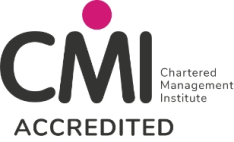CMI Level 3 Diploma in First Line Management Training Course Outline
Our CMI Level 3 Diploma in First Line Management is thoughtfully structured to meet the 120 Guided Learning Hours requirement, providing delegates with 32 hours of comprehensive course material and 88 hours of interactive e-learning content.
Qualification Level: Diploma
Minimum Credit: 13
Unit 3001V1: Personal Development as a First Line Manager (Credit Value 6)
Module 1: Develop and Use a Personal Development Plan
- Relation Between Organisational Objectives and Personal Development Objectives
- Create a Personal Development Plan
- Learning and Development Opportunities
- Review the Progress of the Plan
Module 2: How to Plan and Manage Work?
- Methods or Processes Available to Determine Work Plan Priorities
- How to Manage Time to Achieve Work Plan Objectives?
- Reasons for Incorporating Flexibility into a Work Plan
Module 3: Develop and Maintain Effective Working Relationships
- Leadership Styles and Approaches used in Different Situations
- How to Develop and Maintain Good Working Relationships?
- Working with Team Members to Maintain Standards of Work and Behavior
Module 4: Safeguard the Welfare of the Team
- Responsibilities of a First Line Manager for Safeguarding Team Welfare
- Identify and Monitor Risks Affecting Team Welfare
- Implement Actions upon Identifying a Risk to Team Welfare
Unit 3002V1 Resource Planning (Credit Value 6)
Module 5: How to Plan Resource Needs with the Team to Meet Team Objectives
- Identify a Team’s Responsibilities and Manage Resources
- Components of a Resource Plan
- Impact of Environment and Legal Factors on the Team Resource Plan
Module 6: Understand the Need for Change to Resource Requirements
- How Information Obtained Impacts on Changes to Resource Requirements?
- Trends and Developments Affecting Resources
- Impact of Resource Change on the Teams Objectives
After completing the instructor-led training, we'll move to our self-paced training to complete the certification.
Module 7: Be Able to Monitor, Record and Control Resources Within the Work Area
- Need to Monitor and Record the Use of Resources
- Importance of Accurate Records
Unit 3003V1 Meeting Stakeholder Needs
Module 8: Be Able to Identify Stakeholders and Plan to Meet their Needs
- Identify Stakeholders in Relation to the Team’s Objectives
- How the Team’s Objectives Meets Stakeholder Requirements?
- Create Teamwork Plans with Stakeholder Commitment
- Evaluate and Modify the Work Plans
Module 9: Process Required to Continually Improve Meeting Stakeholder Needs
- Identify Improvements to Meet Stakeholder Needs
- Identify Resources and Costs to Support Improvements
- Identify Benefits Obtained from Improvements
Module 10: Be Able to Prepare a Case to Support a Change
- Identify Recipients of a Change Proposal
- Components of a Case for Change
- How a Case for Change Supports the Team’s Objectives?
- How to Monitor and Review the Effect of the Change?
Unit 3004V1 Managing and communicating information (Credit Value 6)
Module 1: Be Able to Gather and Select Data
- Identify Criteria Used in Sourcing Data
- Identify Quantitative and Qualitative Sources of Data
- Access Data Legally and as Per Organizational Needs for Work Activities
Module 12: Be able to interpret data and information related to a work activity
- Select Data and Information Specifically Related to the Work Activity
- Identify Trends and Patterns
- Identify the Impact of the Trends and Patterns on Future Activities
- Identify Conclusions and make Recommendations
Module 13: Be able to communicate the results of the information analysis
- Identify the Communication Methods
- Identify the Target Audience for the Communication
- Evaluate the Impact of the Communication
Unit 3005V1 Identifying Development Opportunities (Credit Value 6)
Module 14: Factors Involved in Leading a Team to Achieve Agreed Objectives
- Describe the Principles Underlying Leadership of Individuals and Teams
- Links Between Individuals, Teams and Organizational Objectives
- Methods of Communicating Individual and Team Objectives
Module 15: Understand the Current Competencies of Individuals and Teams
- Describe methods of Conducting Individual and Team Competence Reviews
- Links Between Current Competencies, Team and Organizational Objectives
- Activities for Team Competency Development
- Impact of Current Competencies on Organizational Objectives
Module 16: How to Develop the Competencies of Individuals and Teams?
- Identify Development Opportunities for Individuals and Teams
- Methods of Agreeing Development Opportunities with Individuals and Teams
- Processes to Measure and Review Individual and Team Development Objectives
Unit 3008V1: Improving Team Performance (Credit Value: 7)
Module 17: Identify Issues Which Affect Performance
- Manager’s Role in Identifying Performance Issues in the Team
- How to Evaluate Individual and Team Performance and Behaviors?
- Limits of Responsibility for Dealing with Individual and Team Performance
Module 18: How to Select and Apply the Best Course of Action to Address a Performance Issue?
- Range of Approaches Available
- Methods to Improve Performance of an Individual
- How to Conduct a Performance Counselling Session for an Individual?
- Importance of Maintaining Confidentiality
Module 19: Take Action to Achieve the Performance Issue of an Individual
- Agree with a Team Member an Action Plan to Address a Performance Issue
- Range of Support Services Available
- How to Ensure That the Desired Outcomes are Achieved?
- Circumstances When Disciplinary and Grievance Procedures May Be Invoked
- First Line Manager’s Role in a Disciplinary and Grievance Situation
- Why Records of Action Plan Achievements and Actions Taken are Required?




































 Back to course information
Back to course information




 If you wish to make any changes to your course, please
If you wish to make any changes to your course, please

